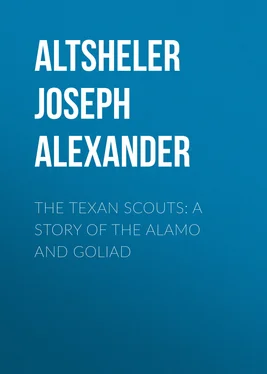Joseph Altsheler - The Texan Scouts - A Story of the Alamo and Goliad
Здесь есть возможность читать онлайн «Joseph Altsheler - The Texan Scouts - A Story of the Alamo and Goliad» — ознакомительный отрывок электронной книги совершенно бесплатно, а после прочтения отрывка купить полную версию. В некоторых случаях можно слушать аудио, скачать через торрент в формате fb2 и присутствует краткое содержание. Жанр: foreign_children, foreign_antique, foreign_prose, prose_military, на английском языке. Описание произведения, (предисловие) а так же отзывы посетителей доступны на портале библиотеки ЛибКат.
- Название:The Texan Scouts: A Story of the Alamo and Goliad
- Автор:
- Жанр:
- Год:неизвестен
- ISBN:нет данных
- Рейтинг книги:5 / 5. Голосов: 1
-
Избранное:Добавить в избранное
- Отзывы:
-
Ваша оценка:
- 100
- 1
- 2
- 3
- 4
- 5
The Texan Scouts: A Story of the Alamo and Goliad: краткое содержание, описание и аннотация
Предлагаем к чтению аннотацию, описание, краткое содержание или предисловие (зависит от того, что написал сам автор книги «The Texan Scouts: A Story of the Alamo and Goliad»). Если вы не нашли необходимую информацию о книге — напишите в комментариях, мы постараемся отыскать её.
The Texan Scouts: A Story of the Alamo and Goliad — читать онлайн ознакомительный отрывок
Ниже представлен текст книги, разбитый по страницам. Система сохранения места последней прочитанной страницы, позволяет с удобством читать онлайн бесплатно книгу «The Texan Scouts: A Story of the Alamo and Goliad», без необходимости каждый раз заново искать на чём Вы остановились. Поставьте закладку, и сможете в любой момент перейти на страницу, на которой закончили чтение.
Интервал:
Закладка:
Ned's heart sank as he beheld the evident extent of the Mexican array. The little Texan force left in the field could be no match for such an army as this.
Nevertheless, his resolution to go through the Mexican camp hardened. If he came back with a true and detailed tale of their numbers the Texans must believe and prepare. He drew the brim of his sombrero down a little further, and pulled his serape up to meet it. The habit the Mexicans had of wrapping their serapes so high that they were covered to the nose was fortunate at this time. He was now completely disguised, without the appearance of having taken any unusual precaution.
He walked forward boldly and sat down with a group beside a fire. He judged by the fact that they were awake so late that they had but little to do, and he saw at once also that they were Mexicans from the far south. They were small, dark men, rather amiable in appearance. Two began to play guitars and they sang a plaintive song to the music. The others, smoking cigarritos, listened attentively and luxuriously. Ned imitated them perfectly. He, too, lying upon his elbow before the pleasant fire, felt the influence of the music, so sweet, so murmurous, speaking so little of war. One of the men handed him a cigarrito, and, lighting it, he made pretense of smoking—he would not have seemed a Mexican had he not smoked the cigarrito.
Lying there, Ned saw many tents, evidence of a camp that was not for the day only, and he beheld officers in bright uniforms passing among them. His heart gave a great jump when he noticed among them a heavy-set, dark man. It was Cos, Cos the breaker of oaths. With him was another officer whose uniform indicated the general. Ned learned later that this was Sesma, who had been dispatched with a brigade by Santa Anna to meet Cos on the Rio Grande, where they were to remain until the dictator himself came with more troops.
The music ceased presently and one of the men said to Ned:
"What company?"
Ned had prepared himself for such questions, and he moved his hand vaguely toward the left.
"Over there," he said.
They were fully satisfied, and continued to puff their cigarritos, resting their heads with great content upon pillows made of their saddles and blankets. For a while they said nothing more, happily watching the rings of smoke from their cigarritos rise and melt into the air. Although small and short, they looked hardy and strong. Ned noticed the signs of bustle and expectancy about the camp. Usually Mexicans were asleep at this hour, and he wondered why they lingered. But he did not approach the subject directly.
"A hard march," he said, knowing that these men about him had come a vast distance.
"Aye, it was," said the man next on his right. "Santiago, but was it not, José?"
José, the second man on the right, replied in the affirmative and with emphasis:
"You speak the great truth, Carlos. Such another march I never wish to make. Think of the hundreds and hundreds of miles we have tramped from our warm lands far in the south across mountains, across bare and windy deserts, with the ice and the snow beating in our faces. How I shivered, Carlos, and how long I shivered! I thought I should continue shivering all my life even if I lived to be a hundred, no matter how warmly the sun might shine."
The others laughed, and seemed to Ned to snuggle a little closer to the fire, driven by the memory of the icy plains.
"But it was the will of the great Santa Anna, surely the mightiest man of our age," said Carlos. "They say that his wrath was terrible when he heard how the Texan bandits had taken San Antonio de Bexar. Truly, I am glad that I was not one of his officers, and that I was not in his presence at the time. After all, it is sometimes better to be a common soldier than to have command."
"Aye, truly," said Ned, and the others nodded in affirmation.
"But the great Santa Anna will finish it," continued Carlos, who seemed to have the sin of garrulity. "He has defeated all his enemies in Mexico, he has consolidated his power and now he advances with a mighty force to crush these insolent and miserable Texans. As I have said, he will finish it. The rope and the bullet will be busy. In six months there will be no Texans."
Ned shivered, and when he looked at the camp fires of the great army he saw that this peon was not talking foolishness. Nevertheless his mind returned to its original point of interest. Why did the Mexican army remain awake so late?
"Have you seen the President?" he asked of Carlos.
"Often," replied Carlos, with pride. "I fought under him in the great battle on the plain of Guadalupe less than two years ago, when we defeated Don Francisco Garcia, the governor of Zacatecas. Ah, it was a terrible battle, my friends! Thousands and thousands were killed and all Mexicans. Mexicans killing Mexicans. But who can prevail against the great Santa Anna? He routed the forces of Garcia, and the City of Zacatecas was given up to us to pillage. Many fine things I took that day from the houses of those who presumed to help the enemy of our leader. But now we care not to kill Mexicans, our own people. It is only the miserable Texans who are really Gringos."
Carlos, who had been the most amiable of men, basking in the firelight, now rose up a little and his eyes flashed. He had excited himself by his own tale of the battle and loot of Zacatecas and the coming slaughter of the Texans. That strain of cruelty, which in Ned's opinion always lay embedded in the Spanish character, was coming to the surface.
Ned made no comment. His serape, drawn up to his nose, almost met the brim of his sombrero and nobody suspected that the comrade who sat and chatted with them was a Gringo, but he shivered again, nevertheless.
"We shall have a great force when it is all gathered," he said at length.
"Seven thousand men or more," said José proudly, "and nearly all of them are veterans of the wars. We shall have ten times the numbers of the Texans, who are only hunters and rancheros."
"Have you heard when we march?" asked Ned, in a careless tone.
"As soon as the great Santa Anna arrives it will be decided, I doubt not," said José. "The general and his escort should be here by midnight."
Ned's heart gave a leap. So it was that for which they were waiting. Santa Anna himself would come in an hour or two. He was very glad that he had entered the Mexican camp. Bidding a courteous good night to the men about the fire, he rose and sauntered on. It was easy enough for him to do so without attracting attention, as many others were doing the same thing. Discipline seldom amounted to much in a Mexican army, and so confident were both officers and soldiers of an overwhelming victory that they preserved scarcely any at all. Yet the expectant feeling pervaded the whole camp, and now that he knew that Santa Anna was coming he understood.
Santa Anna was the greatest man in the world to these soldiers. He had triumphed over everything in their own country. He had exhibited qualities of daring and energy that seemed to them supreme, and his impression upon them was overwhelming. Ned felt once more that little shiver. They might be right in their view of the Texan war.
He strolled on from fire to fire, until his attention was arrested suddenly by one at which only officers sat. It was not so much the group as it was one among them who drew his notice so strongly. Urrea was sitting on the far side of the fire, every feature thrown into clear relief by the bright flames. The other officers were young men of about his own age and they were playing dice. They were evidently in high good humor, as they laughed frequently.
Ned lay down just within the shadow of a tent wall, drew his serape higher about his face, and rested his head upon his arm. He would have seemed sound asleep to an ordinary observer, but he was never more wide awake in his life. He was near enough to hear what Urrea and his friends were saying, and he intended to hear it. It was for such that he had come.
Читать дальшеИнтервал:
Закладка:
Похожие книги на «The Texan Scouts: A Story of the Alamo and Goliad»
Представляем Вашему вниманию похожие книги на «The Texan Scouts: A Story of the Alamo and Goliad» списком для выбора. Мы отобрали схожую по названию и смыслу литературу в надежде предоставить читателям больше вариантов отыскать новые, интересные, ещё непрочитанные произведения.
Обсуждение, отзывы о книге «The Texan Scouts: A Story of the Alamo and Goliad» и просто собственные мнения читателей. Оставьте ваши комментарии, напишите, что Вы думаете о произведении, его смысле или главных героях. Укажите что конкретно понравилось, а что нет, и почему Вы так считаете.












